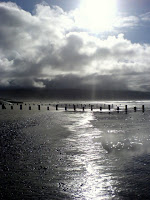So, what's been happening while I've been away? Well, not a brilliant week for English football, quelle surprise. My memories of half a century of World Cups and European Championships are of variations on the theme of "England can still theoretically qualify if..." involving unlikely combinations of Sweden beating Italy by at least 8 goals and Portugal invading Scotland. Bring back Glenn ("I have a number of alternatives, and each one gives me something different") Hoddle, I say. And Eileen.
Not the best of weeks at HM Customs and Revenue, either. The coverage I've seen about the lost CDs seems to me to miss the real point. It was obviously daft to entrust such sensitive data to Mr Postie, but the problem apparently arose because HMCR couldn't create a filtered dataset (i.e. the limited data as requested by the National Audit Office, with no banking or address information) without commissioning expensive, additional work from Capgemini (who manage HMCR's IT systems, at an estimated 10-year cost of £8bn). This raises many questions. Firstly, why has HMCR handed Capgemini such control over the database that HMCR can't even do its own simple queries on the data? And how could it possibly be an expensive operation for Capgemini to service such a request? How much work can be involved in something that should be as simple as changing a command that extracts all data from a database ('SELECT * FROM ...' in SQL, a standard database query language) to a filtered extraction ('SELECT Name, NumberOfChildren etc FROM ...' in SQL)? And if it isn't as simple as that, why not?
Anyway, football and security failures hardly matter if a report in this week's New Scientist is to be believed. Under the less than reassuring headline "Have we just sealed the universe's fate?" we're told that the future of the entire universe may now be at risk, as a result of our enquiring too deeply into its workings. According to a paper by Lawrence Krauss (who I mentioned in a previous post for his criticism of Richard Dawkins as being too emotive in his atheism) and James Dent, we have looked upon that which it would have been better not to have looked upon. As if the destruction of our own planet wasn't enough, it seems that we may have inadvertently tipped the universe into a state where it is more likely to spontaneously vanish. Which would be a bit of a shock, and a disappointment, for its inhabitants.
There is, apparently, something called the quantum Zeno effect; whenever we observe or measure something at the quantum level, we reset a clock in the observed system that controls when it is likely to decay into another state. So when, in 1998, we measured the light from distant supernovae explosions, thus gaining evidence of the existence of dark energy, little did we imagine that we might, in doing so, have reset the clock in the universe's false vacuum back to a point where it is less likely to survive. The end of the universe, and to think I used to be scared of Boltzmann Brains!
It's very hard to think logically about this, and other arguments along the same anthropocentric lines ("the universe only exists when we observe it", etc). For example, what would have happened if, in the experiment to measure the supernovae light, a fly had landed on the telescope lens and intercepted the light with its multisegmented eye? Would the fly's 'observation' of the light have the same disastrous consequences? Or, suppose that the experiment had been outsourced to Capgemini, who saved the results on a database but then didn't allow the scientists access to it? Could we still be said to 'know' about dark energy, thereby risking the survival of the universe? Perhaps we can take comfort from the Many Worlds model, which says that, if a wave-function collapses with one result, e.g. the disappearance of the universe, it will also produce a parallel result in which the universe doesn't disappear. And, via the anthropocentric principle, that non-disappearing universe will be the one in which we find ourselves.
 It's all very confusing. Thank goodness for the simple pleasures of the beach, even if it's a little chilly at this time of year. More later, if we're still here...
It's all very confusing. Thank goodness for the simple pleasures of the beach, even if it's a little chilly at this time of year. More later, if we're still here...
